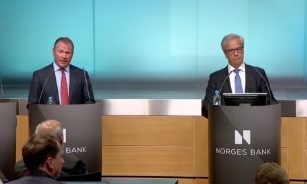Norway’s Oil Fund ended a stormy first half of the year with just as much value as it had before having to face crises tied to the Corona virus, the economy and its own future leadership. The fund is still worth a dizzying NOK 10,340 billion, up more than NOK 250 billion since the end of last year.

Norwegian Broadcasting (NRK) noted last week how the fund, fueled by the country’s offshore oil and gas revenues that are invested to benefit current and future generations, has arguably been through its most dramatic and volatile six months ever. The value of its heavily stock-related portfolio has both sunk and spiked, and been affected by Norway’s weak krone. With oil priced in US dollars, they generate far more kroner (as much as NOK 11 to a US dollar at one point this spring) than they did a few years ago.
Even though the stock markets in which the Oil Fund has invested all but crashed when the Corona crisis began, most have since shot back up again. The fund, formally named the Government Pension Fund Global, logged some large losses during the first quarter followed by strong gains in the second quarter.
The most drama around the Oil Fund, however, has involved the announcement in March by Norway’s central bank (Norges Bank, which is responsible for it) that the highly successful Norwegian hedge fund manager, art collector and billionaire philanthropist Nicolai Tangen would take over as its boss later this year.
Tangen, who’s been working from London since 1992, became the target of immediate controversy for two major reasons: potential conflicts of interest regarding his own massive investments and those of the Oil Fund, and his frequent use of tax havens as a base for his own ventures and companies in which he invests. Some wonder whether the Nordic region’s unspoken code of conduct called janteloven (Law of Jante), under which ambition and talent can be punished, may have a role too.

Central bank officials had also withheld Tangen’s name as a candidate for the job as chief executive of its unit running the Oil Fund, Norges Bank Investment Management (NBIM). The secrecy defied public demands for openness in Norway and has been blasted by many Members of Parliament and commentators. A lavish party hosted by Tangen last fall at his alma mater, the University of Pennsylvania’s Wharton School of business, didn’t help either. Tangen had invited many top Norwegian business leaders, friends in high positions and public officials including the Oil Fund’s current CEO Yngve Slyngstad, who later publicly apologized for allowing Tangen to pay for his accommodation, meals, a private concert by Sting and a flight on a large, luxurious and privately chartered jet back home to Norway. Many other high-profile Norwegian guests were also criticized for accepting Tangen’s extravagant hospitality.
‘Historic’ review
It all reached a climax late this spring when the Supervisory Council of Norges Bank, which acts on behalf of Parliament, felt compelled to review the employment process behind Tangen’s appointment by Norges Bank’s Executive Board. The council was far from pleased.
Even though Tangen has repeatedly stated that he’ll be severing all ties to his personal assets and his London-based investment management firm AKO Capital, the council doesn’t think that’s so. Transferring them to a foundation over which he’ll have no control isn’t enough, determined the council and its leader Julie Brodtkorb. She ended up sending what’s been called an “historic letter” to Parliament last month, detailing the council’s dissatisfaction with how Norges Bank and its governor, Øystein Olsen, hired Tangen.
The letter criticized the employment process around Tangen, expressed concern that his ties to his own fortunes weren’t entirely cut and that information on the performance of his AKO funds could still filter through to him via personal connections on the new foundation’s board. The council noted that not all agreements related to Tangen’s employment were settled, meaning good “control measures” were not yet in place.
Hearing looms in August
The council basically asked the Parliament to take a closer look themselves at Tangen’s employment, and a majority responded just before the summer recess by calling in both Brodtkorb and central bank chief Olsen to a Finance Committee hearing in mid-August. That’s highly unusual, “but extremely important,” according to Labour Party MP Hadia Tajik, in order “to go through (Tangen’s) employment process” carefully. “It’s good that the Parliament will now have an opportunity to go through the Supervisory Council’s evaluations,” Tajik told reporters.
Members of Parliament seem to be calling for even more than a firewall between Tangen’s personal investment interests and those of the Oil Fund. They believe that if Brodtkorb, a long-time member of the Conservative Party and close associate of Prime Minister Erna Solberg, and the council she leads are uneasy about Tangen’s employment, there’s reason for the Parliament to be uneasy as well.

Several political commentators have described the council’s letter as “crass criticism” of both Norges Bank Governor Øystein Olsen and the central bank’s executive board. Some fear Olsen and his colleagues were so dazzled by the prospect of a billionaire like Tangen even considering the job of Oil Fund chief that they’ve been lax on control themselves.
Olsen and his executive board had gone through with the employment agreement in late May despite the council’s concerns during earlier meetings. After the council responded by sending the letter to Parliament, Olsen seemed to fight back by issuing a statement that indeed all aspects of Tangen’s employment contract were “yet to be finalised, and that establishing sufficient internal control measures remains to be done.”
Olsen himself stated that the measures “would be in place before Nicolai Tangen takes up his position,” currently set to occur on September 1. Olsen claimed that Tangen’s employment contract will create “sufficient distance between Nicolai Tangen’s private finances, the AKO system and the job that he will carry out” as Oil Fund boss. Olsen stated that “mechanisms are established which ensure that Tangen will have no influence on his fund investments for as long as he is employed by Norges Bank, and which prevent possible conflicts of interest and impartiality.”
Olsen added that Tangen “will acquaint himself” with the Oil Fund organization during the summer “and we look forward to his taking up the position” on September 1. Newspaper Dagens Næringsliv (DN) reported in mid-June that Tangen has already been invited into the Oil Fund’s offices “as an external guest” before the Parliamentary hearing is held in mid-August.
Sell-off ultimatum arises
More details of the central bank’s agreement with Tangen were released last week. Not only is Brodtkorb still dissatisfied, she unleashed more criticism, telling reporters that the agreement failed to remove all risk. She told DN that while the bank’s board claims the pact addresses the risks (of conflicts of interest), the council claims all risk “must be eliminated.”
Brodtkorb points to the central bank’s ethical principles that are supposed to apply to everyone on the payroll: “Employees can have external positions or ownership interests that are or can be in conflict with the interests employees must hold as employees of Norges Bank.” She can’t understand why those principles don’t apply to Tangen, even though he’d have to sell off all his holdings to meet them.

DN reported as early as May that Tangen would never have considered accepting the job as head of the Oil Fund if he’d been asked to sell off his life’s work, AKO Capital. Norges Bank never asked him to do so, and that’s now at the core of the conflict with Parliament.
“It there had been a demand that I should sell off what I’d spent 15 years of my life building up, I wouldn’t have been interested in the job at all,” Tangen told DN. “It would have been completely improbable.” Any such demand, he suggested, would also mean that the public sector would hardly ever be able to attract anyone from the private sector.
Olsen confirmed that he never asked Tangen to consider selling out of AKO Capital either. “There was never any demand from our side other than that he maintains passive ownership,” Olsen told DN.
Need for credibility
While critics both in and out of Parliament remain dissatisfied, Tangen continues to enjoy a high degree of respect in business and finance circles and few if any question his talent for making money. He’s now willing to put that talent to use on behalf of the Oil Fund and, in turn, Norwegian retirees for decades to come. Oil Fund money has also been tapped to finance most of the government’s Corona crisis aid relief packages as well.
Those who recognize Tangen’s investment expertise (including Olsen, the central bank’s board, dozens of supporters within Norway’s own business and finance community and commentators like DN‘s Bård Bjerkholt) question why anyone would think he would damage the Oil Fund. Others fear Tangen may get so fed up by all the noise over his appointment in Norway that he’ll simply withdraw.
Olsen’s position would thus also be in jeopardy. One thing is clear: several Members of Parliament appear to already have decided that they don’t want Tangen running the Oil Fund. Since only the finance minister can technically overturn a central bank appointment, the question then is how MPs can succeed in preventing Tangen from assuming his new post this fall.
NewsInEnglish.no/Nina Berglund

